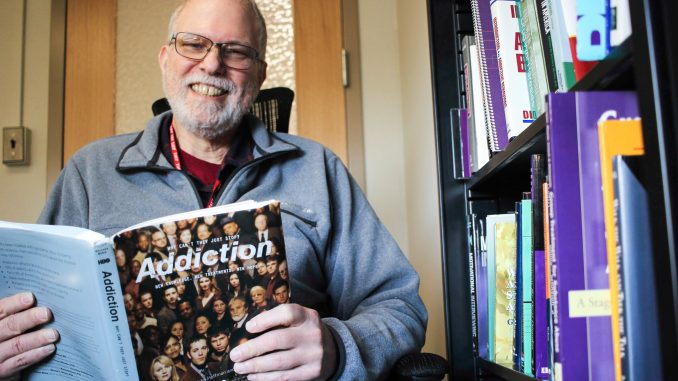
One semester, three-quarters of Jerry Stahler’s class raised their hands when he asked if they had friends and family die from a drug overdose.
In 2015, he attended the funeral of his daughter’s friend, who died of a drug overdose, and said his own family members suffered from substance use disorders.
“It’s really become an unusual perspective because it’s hitting me everywhere,” Stahler said.
Stahler, 66, is in his 34th year at Temple University and has dedicated almost all of his career to helping people with substance use disorder in a city where more than 1,200 people have died of drug overdoses in 2017.
Stahler has taught in the Department of Geography and Urban Studies for more than two decades and written his share of research on drug addiction and substance use disorders in urban areas.
“It’s an area I’ve been engaged with…community engagement, nonprofit organizations,” he said. “And I have family members who are in recovery, so it’s affected my personal life.”
He is the longest-running instructor of the Inside-Out Prison Exchange Program, a semester-long course where about 15 Temple students and 15 incarcerated students engage in dialogue centered around criminal justice, inequality and freedom.
He also sits on the board of Prevention Point Philadelphia, a nonprofit harm-reduction organization that provides resources for people with substance use disorder. He once served on the data analysis and sharing subcommittee of Mayor Jim Kenney’s opioid task force.
He assisted with the task force’s plan to create the country’s first safe-injection site, Safehouse. If it is funded, Safehouse would be the country’s first safe-injection site and would provide overdose prevention, treatment services and a safe place for people to use drugs under medical supervision.
Stahler is also on the board of directors at Gaudenzia, which helps people who suffer from drug and alcohol dependence, and serves on the university’s opioid task force.
As a member of Temple’s task force, Stahler organized faculty across the university to conduct substance abuse research, said Dr. Ellen Unterwald, the director for Temple’s Center for Substance Abuse Research. Stahler was instrumental to the research arm of the task force, she said.
“He’s played many different roles with the university,” Unterwald said. “His research is also outstanding.”
Stahler testified to the Philadelphia City Council’s Committee of Public Health and Human Services in 2016, delivering his thesis on drug overdose and drug prevention.
Stahler suggested the city label the opioid epidemic as a public health emergency, provide funding for overdose prevention and address how benzodiazepines, or anti-anxiety medications, have contributed to Philadelphia’s overdose deaths. He also promoted the widespread distribution of naloxone, an overdose reversal nasal spray, to not only first responders but also to organizations, friends and family members.
Two years after earning his Ph.D. in clinical psychology from Temple in 1983, the university invited Stahler back as associate vice provost for research. In this role, he helped create policies that encouraged research and assisted faculty members with grant proposals.
In 1991, the university allowed Stahler to choose the department in which he wanted to teach. He decided to branch away from traditional psychology and pursue geography and urban studies in 1992.
“It seemed to be a very good match,” Stahler said. “It’s a department that’s very interdisciplinary, so I could pursue my interest in urban social problems particularly around addiction.”
Dean of Students Stephanie Ives met Stahler five years ago when he asked her to join a panel for his Drugs in Urban Society course.
“He makes you feel very comfortable talking about what can be a very difficult and very emotional issue,” Ives said. “He affirms everyone comes from a different perspective, and everyone has something very valuable to contribute to the conversation.”
As someone who has had the opioid epidemic affect his loved ones, Stahler makes sure his students show compassion to those who have substance use disorder.
“The way someone acts during addiction is not who they actually are,” Stahler said. “Be as helpful as you can.”
Stahler’s compassion for others is what makes him a valuable faculty member, Ives said.
“His energy is so auspicious,” she added. “He is just a kind and warm, open, professor. He is so not judgemental. …He’s just a wonderful man.”



Be the first to comment